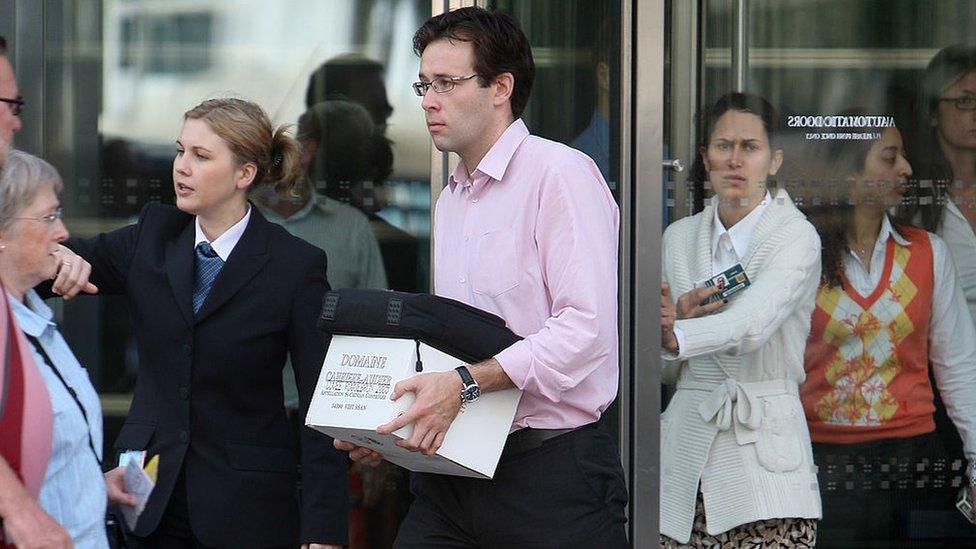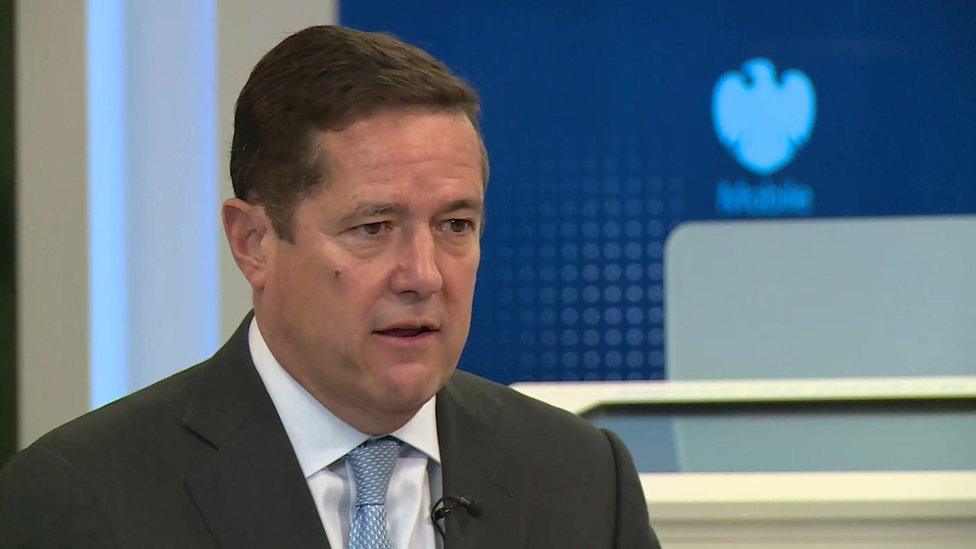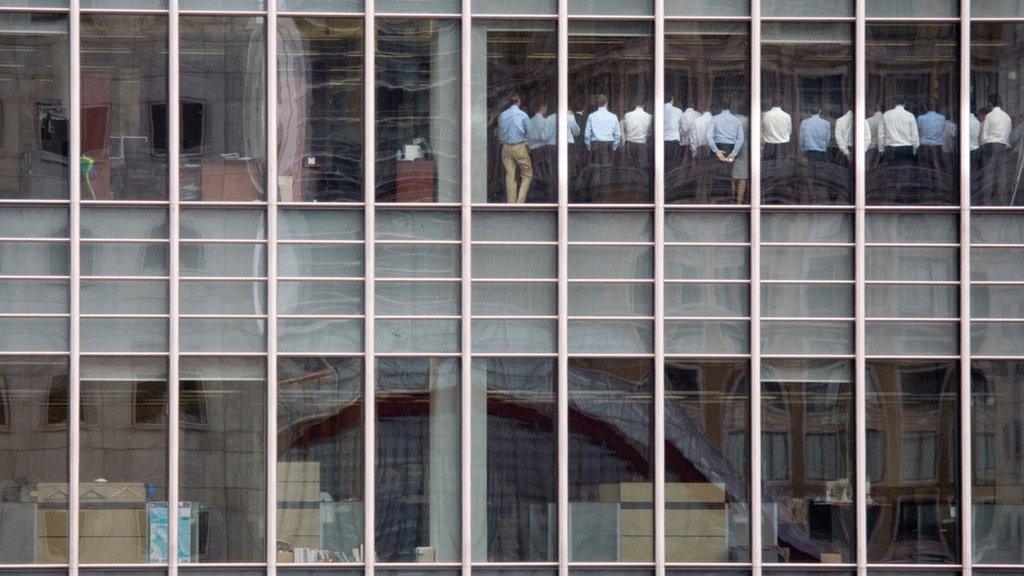The day Lehman Brothers went under
- Published

Ten years ago, investment bank Lehman Brothers filed for bankruptcy in the US. Its UK operations ceased shortly afterwards.
The BBC talked to people involved about their recollections of the bank's collapse, which gave the financial crisis fresh momentum before the worst economic downturn the world had seen since the 1930s.

Natalia Rogoff, worked in international client sales at Lehman Brothers
'Slowly, the anger set in'
"I lost my dream job at Lehman Brothers and started a pasta firm"
We knew when the share price went down - we all went home, it was a Friday night, and we knew we would not see Lehman Brothers as it was.
We stayed up all night checking the wires and Bloomberg and the news hit.
I remember very vividly, I was at a party and we were texting each other, and then this wire hit Bloomberg saying that Lehman in America [had] filed for bankruptcy. And it was something unthinkable.
We started calling each other and emailing everyone, "Did you see the news?" We had to come in on the Monday, and we faced all the reporters outside.
The first emotion that hit very hard was disbelief. There were no words. You came into the building and [people were saying], "Did you hear?", "Yes", "When did you hear?", "I was up all night", "Yes, so was I", "So, what shall we do?", "Do you think we're going to get paid?", "I don't know".
With news as huge as that, it takes a while to sink in. The bank collapsed, we are still in the building, there is no official news from the management, they are all behind closed doors, there's nothing from the US, everyone disappeared.
And then, slowly, the anger set in.
Not many people know, we were actually coming back to work every day for the next two weeks.
That was an extremely weird experience, because you had no job, the clients were calling, there was nothing to do, people were just walking around, probably not even drinking that much coffee to save some money.
Just on the trading floor, everybody walking, no-one's trading, and the phone's ringing. The clients were ringing all day long, they were wanting to know - where is their money, what's going on?

Nikolay Storonsky, Emilie Bellet, Anil Stocker - former Lehmans workers
"I lived through the biggest bankruptcy in history"

Sarah Breeden, executive director for international banks supervision at the Prudential Regulation Authority
'I cycled home as fast as I could'

Sarah Breeden helped with efforts to keep London's financial markets afloat
I work at the Bank of England, and I was heavily involved in the work that we did to handle the consequences of Lehman defaulting back in 2008.
It had been building for some time.
In the UK, if you remember, we'd had Northern Rock get into troubles in the autumn of 2007, that was nationalised in February 2008, and then not long after Bear Stearns, which was the smallest of the US broker-dealers, got into trouble and was rescued by JP Morgan [Chase].
So it wasn't that in September [the Lehman collapse] was a shock, it had been an event that we'd seen coming for some time, and had been trying to get ready for.
On the Sunday, that was when it became apparent that Lehman wasn't going to be rescued - and that was the point that I got involved.
I was cycling in Richmond Park at Sunday lunchtime with my family, got a phone call from Paul Tucker [former deputy governor of the Bank of England] to say, "The US are going to let Lehman's go, I think we'd better get the team in," and it all started from there.
I cycled home as fast as I could, got on the train, and I was in by three o'clock. We got a small team together, and we were here till late, and then obviously we were in first thing on Monday morning.
What we were trying to do was understand who had direct exposures to Lehman. There was all sorts of work going on desperately trying to think what were the immediate consequences, who would be affected, and how that would play out in markets generally.

Jes Staley, current Barclays chief executive
'Terrifying times'

"The overriding thought after the Lehman bankruptcy was: 'Who's next?'"
We were working most weekends at that time, because there were concerns not only about Lehman Brothers, but about Merrill Lynch, Morgan Stanley, pretty much the entire investment banking platform.
At that time I was running JP Morgan Asset Management, and we had the second largest liquidity fund in the world, and the single largest investor in that fund was a major sovereign country.
I remember one morning, a couple of days after the Lehman bankruptcy, I got a call from Morgan's London office, basically saying that that large sovereign wanted to withdraw all of their money.
And I remember waking up with the call about 3:30 in the morning, and turning to my wife and said, "This could be a very scary next couple of days."
They were terrifying times. There were a lot of unknowns, it was difficult to understand what was really going on, and Lehman was just one domino in a series of dominoes.
And the overriding thought after the Lehman bankruptcy was: 'Who's next'?

Tony Lomas, former lead PwC administrator for Lehman Brothers in the UK
'It's a big forensic exercise'

Tony Lomas says $100m was borrowed from a hedge fund to pay Lehman UK staff

I took a phone call on the Saturday evening from the head of legal inside Lehman, who asked me if I would attend a board meeting on the Sunday so they could start to prepare for the collapse of the entity in the event that there was no rescue of the overall group in New York over that weekend.
Well, we went in on the Sunday morning and started to interact with the various accounting staff there to try and establish what the organisational structure was there, what the legal entities were, which legal entities would be in financial difficulty if the parent company filed for bankruptcy.
So, it's a big forensic exercise that day.
On the Monday morning the main legal entity in the UK needed to repay something in the order of $3bn to its trading counterparties, and of course it was dependent upon that cash coming overnight on the Sunday - and it didn't come.
As soon as you're appointed [as administrator], of course, you take control of the whole entity, and the first thing you do is establish what assets it's got, and what liabilities it's got.
And among the assets you're looking for liquid assets so that you can start to pay the bills [that were due imminently]. We needed about $100m, and we couldn't find liquid assets that would realise that in time.
So what we actually had to do was to borrow $100m from a hedge fund, which we did by the close of play on the Wednesday.
The problem here was that an awful lot of counterparties traded with Lehman [but] they didn't identify the Lehman legal entity that they were dealing with.
Lehman in the UK probably did have as many assets as it did liabilities, because we've been in a very fortunate position - we've been able to repay everybody everything they were owed, and that adds up to about £36bn-£37bn.
And we have £8bn left over after that. Now that effectively is what remains of the capital of the UK subsidiary company.
- Published12 September 2018

- Published12 September 2018